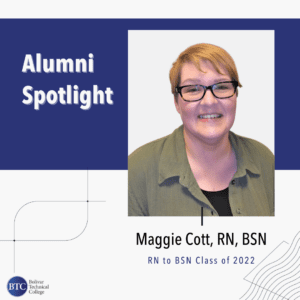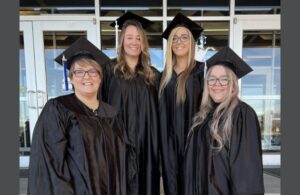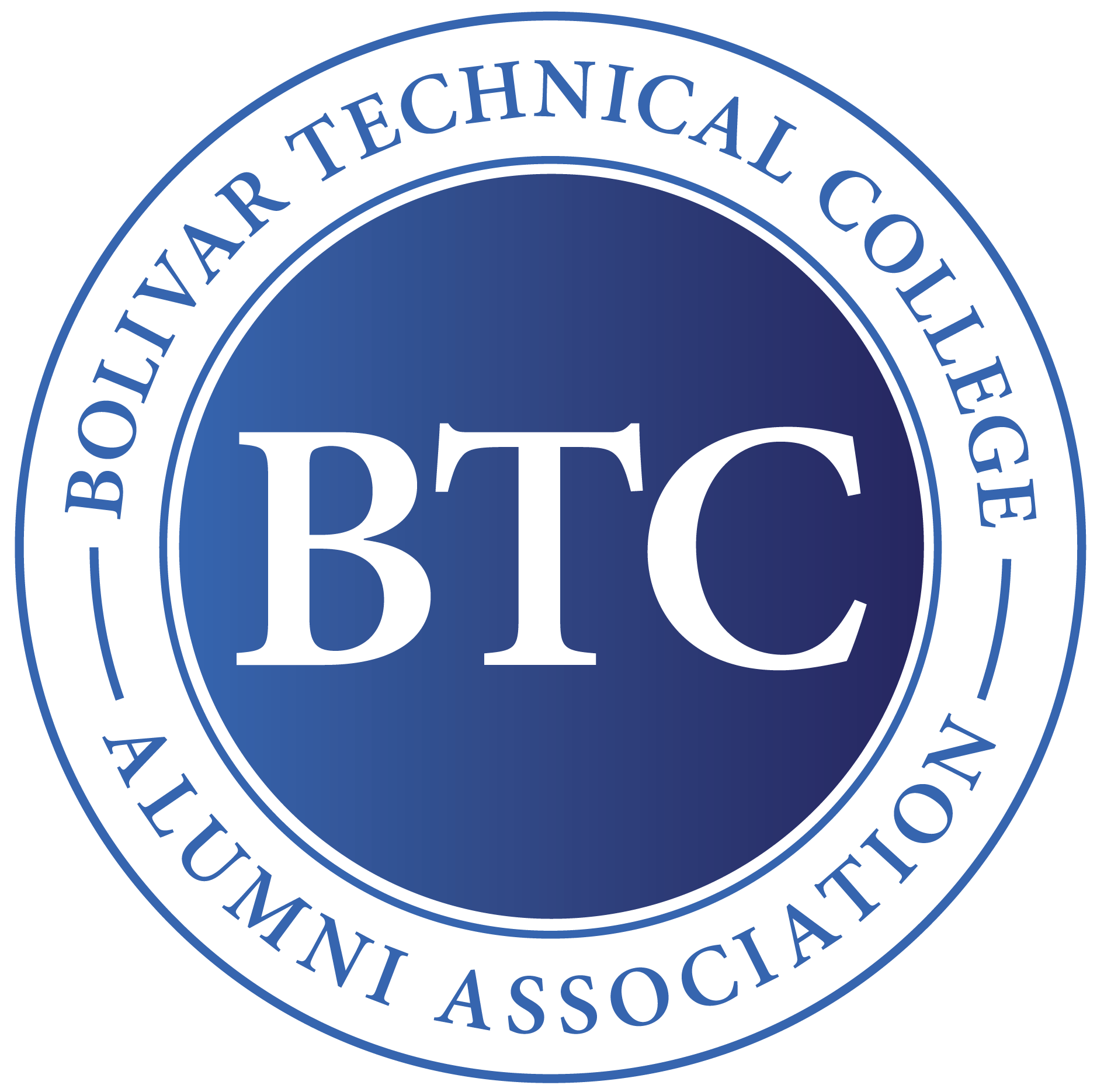Meet our June Alumni Spotlight: Maggie Cott, RN, BSN

Our very own Maggie Cott, a graduate of BTC’s RN to BSN Completion program, recently spoke with Haleigh Gray, the Student Online Support Coordinator at Bolivar Technical College. Maggie’s journey from the RN program to earning her Bachelor of Science in Nursing is truly inspirational. Starting off in the fast-paced Neuro-Trauma ICU, life took a turn when she went through open-heart surgery, and now she has transitioned to the Structural Heart team in Cardiology. She’s got some amazing insights to share about how BTC’s BSN program has transformed her professional growth. So, let’s dive into Maggie’s interview about her experience in the BSN program!
Haleigh: Why did you decide to pursue your BSN?
Maggie: Initially, it was mainly because I wanted to challenge myself and achieve my four-year degree in my mid-40s. It also benefits my position here at Cox. Additionally, the BSN program was offered through Bolivar, and I had a great experience during my associate’s degree there, so that was another reason.
Haleigh: When you became an RN, did you always plan on becoming a nurse educator, or did your plans change along the way?
Maggie: My plans did change. Initially, my goal was to get my associates, become an RN, and work in neurotrauma ICU. However, life took a different turn when I underwent open-heart surgery. That experience as a patient led me to focus more on education. Even in the clinic where I currently work, I prioritize patient-centered care education. So my path veered off from my initial plans.
Haleigh: So it was a personal experience rather than the influence of a family member or friend that led you to pursue your BSN?
Maggie: Yes, it was a personal experience. Mrs. Mock, one of my professors, played a significant role as well. We had a study group, and she recognized our teaching abilities and encouraged me to pursue my BSN. I even discussed my plans and background with her when I started the BSN program. It has been a combination of factors that influenced my decision.
Haleigh: Now that you have your BSN, besides teaching, what other opportunities are available to you in the clinical setting or elsewhere compared to having an ASN?
Maggie: With a BSN, you can explore roles in nurse management. It is a requirement for higher positions in nursing, including nurse management and administration, such as Director of Nursing. Hospitals like Cox, with their magnet status, are increasingly favoring BSN-prepared nurses, even for bedside positions. So, having a BSN opens doors to advancement and broader career opportunities.
Haleigh: What specific skills or knowledge gained through the BSN program make you eligible for those positions and make hospitals prefer BSN-prepared nurses at the bedside?
Maggie: The ability to conduct research is crucial. Learning research methods and conducting in-depth research is part of the BSN program, even from a nursing management perspective. Nurses in managerial roles need to manage people, and the classes we took prepared us for that. Additionally, courses like statistics help with budgeting and managing patient ratios. All these assignments and skills prepare you for different roles and advancing in the nursing profession.
Haleigh: Now that you are at Cox, how does your day-to-day work differ as a BSN clinical nurse compared to when you had your ASN? Could you walk us through the changes?
Maggie: Currently, I have clinics on Mondays and Fridays for my patients in the specialized area of structural cardiology, which involves procedures like valve replacements. During these clinics, I educate patients about their procedures and what to expect. I serve as their go-to person for questions, handle scheduling, and coordinate their procedures. I also attend clinics with cardiac surgeons. Additionally, I educate Medical Assistants on disease processes, phone triaging for patients, medications, and their mechanisms of action. There is a significant increase in education and employee management. I hold weekly meetings, streamline processes, and even perform tasks related to clinical coordination and infrastructure. The BSN qualification enables me to take on these responsibilities.
Haleigh: Do you feel that your impact on patients’ lives is greater now as a BSN-prepared nurse, particularly in terms of education and long-term relationships?
Maggie: Absolutely. I have a longer relationship with my patients now. For example, I might have performed a procedure on a patient in September, but I am still in contact with them in April for follow-up appointments or to address their concerns. Patients trust me more, seek my opinions and information, and rely on me for ongoing education. The longer relationship allows for a more significant impact compared to bedside nursing.
Haleigh: Pivoting to more of the program and BTC focus – you mentioned Mrs. Mock. Was there a particular instructor or staff member that you felt was really helpful throughout your program, from applying to graduation?
Maggie: Avril, she’s not an instructor, but she’s amazing. She was always able to answer questions and help me with scheduling, financial aid, and other things. And, of course, Mrs. Mock was huge. Being in the first group of the BSN program, it was new for everyone, and Mrs. Mock was always there to bounce ideas off of and ask questions. All the professors we had online were great. They were easy to get ahold of, always responsive, and made sure we were prepared for the class. It was a seamless process, even though it was the first year for the program.
Haleigh: You mentioned that you didn’t meet any of the teachers in person, so how was the online experience with your teachers and classes? How did it differ from being in a seated class?
Maggie: I was worried at first but it turned out to be great. The classes were well-structured, and the teachers were easy to correspond with. We also had our own chat and Facebook group as students, which helped us communicate quickly. Many people are scared of taking online classes, but I found it to be a great experience.
Haleigh: How was the coursework online compared to traditional seated classes? How did you complete discussions and other assignments compared to seated classes?
Maggie: It took some getting used to because you had to be self-sufficient in reading the material and studying. There were no daily lectures with PowerPoint presentations and a professor in person. You had to be disciplined and allocate time for studying and completing assignments throughout the week. In the BSN program, we had weekly quizzes and research papers in different classes. After the first semester block, I got the hang of it. I knew how much time I needed each day to read my chapters, review my work, and finish assignments by the deadline. Self-discipline is key, but overall, it was good for the classes we had.
Haleigh: So, compared to the RN program, would you say it’s less work but requires more self-motivation and discipline?
Maggie: It is less work, but it’s different. You have to push yourself and want to do it. It would be easy to just skim through and not get anything out of it, but you need to understand the concepts. This is a degree where you have to actually grasp the concepts.
Haleigh: You mentioned the clinicals you did with your RN program and the online clinical component with Shadow Health. How was your experience with Shadow Health? How did it compare to regular clinical rotations?
Maggie: It was different because you had to fully understand how it works to get the full benefit. It would be easy to do the bare minimum, but you need to go above and beyond to make sure you get everything you need from it. It was neat because it provided real-world scenarios, especially in the Community Health portion. It allowed us to talk to patients, ask questions, and gather information. It was great for role-playing with patients and taking our time to assess and ask the right questions. It really helped with that aspect.
Haleigh: If you could sum up the whole BSN program experience in a few words or feelings, what would you say?
Maggie: At first, it was scary because it was all online, and I wasn’t sure what to expect. But after the first few weeks, it was a good flow. I felt supported, and I knew I could reach out to several people if needed. The communication was great, and overall, it was an amazing experience. It was even easier than I thought it would be. I was worried about the research papers and advanced coursework, but it turned out to be manageable, especially with the flexibility to schedule around work.
Haleigh: How did you fit the program into your work schedule? Did you work 40 hours a week and then do coursework on the weekends?
Maggie: I worked at the clinic from Monday to Friday, with varying schedules, but it was a 40-hour workweek. Evenings and weekends were dedicated to studying and homework. It was easy for me because I knew my schedule in advance, including assignment due dates. Having control over my schedule made it less stressful to manage studying and assignments.
Haleigh: Who would you recommend to do this BSN program? What kind of people do you think would be a great fit for BTC’s BSN program?
Maggie: I think it’s great for all students as long as they have self-discipline and motivation to do their homework and study to understand the concepts. It’s especially beneficial for working students who are trying to complete their bachelor’s degree while working full time. BTC’s program, the size, and the staff have been amazing from start to finish for me.
Haleigh: How was BTC’s program different from others you looked into?
Maggie: BTC’s program is more personal. We know most of the faculty and staff, and the communication is great. In my experience with the Master’s program I’m going into, it’s all computer-based, and I have no idea who these people are. At BTC, you interact with real people, and it feels more inclusive. In other schools, you can feel like just a student or a number, but I never felt that way at BTC.
Haleigh: If you were talking to someone about to start this program, what advice would you give them to encourage their success?
Maggie: I would tell them to be a self-starter, motivated, and self-disciplined. They need to be able to study and learn on their own without depending on the pressure of being in a seated class. Online programs require personal motivation and discipline.

Thanks for sharing your story with us, Maggie! If you would like to share your story about any of our programs or would like to tell us what you’ve been up to since graduating, we would love to hear it! Just email Haleigh at hgray@bolivarcollege.edu with the subject line “Alumni Spotlight”.
